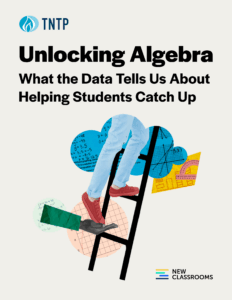The rollout of the Common Core State Standards (CCSS) hasn’t exactly been smooth sailing. Critics have argued that the standards are unfair to teachers, too demanding for students and overly reliant on testing. Union leaders have been among the most vocal opponents of the Core, denouncing it at their summer conventions and even incentivizing teachers to critique and rewrite the standards. Despite all the fuss, though, millions of educators are simply getting on with their work, new standards included. Not only that, but many are coming up with innovative ways to help their colleagues adapt.
Aaron Grossman is one of these teacher leaders. Recently named a Leader to Learn From by Education Week, he’s on leave from the classroom to lead the implementation of the Common Core in Nevada’s second largest school district, Washoe County. Aaron realized that in order to get teacher buy-in on the Common Core, he first needed teacher ownership. And that meant teachers testing out the standards, hands-on, in their classrooms, and assessing the outcomes with colleagues. From this idea, the Core Task Project was born. It prioritizes learning from actual teachers and their experiences in the classroom, rather than outside interpretations of the standards.
We sat down with Aaron to find out what Common Core implementation looks like when teachers take the lead on training their peers.
How did the Core Task Project come about?
I had been focused on Nevada state standards, trying to reconcile them with the CCSS. I got a bit frustrated and wanted to go straight to the source. Eventually, I found a very helpful video from David Coleman, one of the main authors of the standards. I went from being ambivalent to quite curious and hopeful.
I started sharing the video at meetings and the Core Task Project evolved from there. Initially, I limited my outreach effort to people who were directly involved in crafting the CCSS. We call this approach “unfiltered.” Rather than have someone interpret the standards for us, we share information without “translating” it for our colleagues.
Working from this “unfiltered” approach, the Core Task Project team finds the highest quality content that stimulates conversation on the standards and shows various perspectives to keep discussions well rounded. We don’t want to just blindly follow the CCSS, but rather assess what is working and what isn’t.
How was this method received initially?
Educators were naturally skeptical at first, but the video content was helpful—it gave teachers a firm understanding of what the Common Core standards are.
What changed to get teachers on board?
I think the Common Core honors good professional practice. If you pay close attention to what people involved with the CCSS are saying, you learn that they understand that a teacher’s time is limited, that teaching content matters, and that that there are multiple ways of reaching the standards—not one single method.
Convinced of this, teachers started sharing our videos in Professional Learning Communities and staff meetings. They helped us with next steps, including finding research referenced in the videos or materials that helped build a coherent body of knowledge. We didn’t have to sell the CCSS to teachers because they were testing the standards out for themselves. The Core Task Project is driven by classroom-based inquiry.
How do you disseminate the information about the CCSS to your colleagues?
We develop modules of professional learning that can be easily shared. We rely heavily on video so that facilitators can share the content without having to be experts.
We keep a blog so any educator (and any community member) can fully track all of our efforts. We’re starting to experiment with Twitter, too.
And we have “communication leaders” at our sites—point people who can pass on information to other teachers at their schools. We also have a Teacher Leader Cadre—industrious and amazing teachers who we can direct people to if they have questions.
How does the Project’s model work?
The Core Task Project has evolved from its original three-week model to a half-day workshop once a month over the course of the year. Teachers are subbed from their buildings for a half-day of professional learning and work with instructional materials well matched to the Common Core. A month later, the teachers return to describe what happened in their classrooms, engage in some additional professional learning, and plan next steps with fellow participants.
It’s the reflection piece that is critical: teachers are telling us what is working and what isn’t, or what is challenging. In turn, this helps us identify targets for professional learning and resources that will assist with CCSS implementation.
Has there been a noticeable difference in how students respond to classroom projects pre-and post-Core Task team implementation?
Yes. We track some of this work with what we call Instructional Practice Guides, which monitor different indicators: are students retrieving evidence from text to support their answers? Are students building on each other’s observations and insights? Are students persisting with grade level material?
Teachers who move through this yearlong effort also track the progress of five “focus” students. We collect all of this information on reflection forms, then analyze them and look for themes. We ask what was successful or challenging, what was the impact on ELLs, struggling readers, etc., and all of this feedback drives our future efforts.
Stephanie Echeveste is Community Manager for the University of Southern California Rossier School of Education online Master of Education. Washoe County School District is a strategic partner of the USC Rossier School of Education. You can find USC Rossier’s online programs on #Edchat every Tuesday as @USCTeacher.







